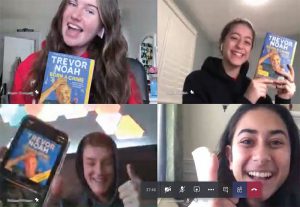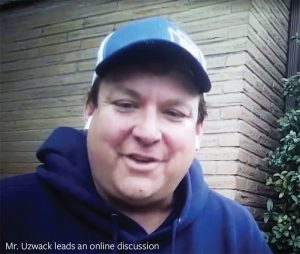
By Sam Uzwack, Associate Head of School for Middle School and Student Support Services
I THINK BACK TO MARCH 2 OFTEN. Morning meetings yielded the ultimate decision; we were sending the students home and would not see them in person until at least after Spring Break. The rest of the day was spent preparing for a lightning-fast switch to online learning. No other school had made this move yet, so there was more than a little bit of apprehension about how the decision would be received.

Students participate in a discussion of the
book Born a Crime by Trevor Noah.
The mood in the TALI Theatre was mixed…more than one student asked, “Why are we having an assembly today?” Afterall, emergency assemblies are rarely about delivering good news.
After announcing our plans to switch to online instruction, we sent the students to a hastily added Advisory period. As I walked around the buildings, checking in with a few folks, I could see the gravity of the situation dawning on the kids. The pandemic sweeping the globe, which to some had seemed distant, was now right on our front step. And the specter of being away from campus, from community, from friends, was not lost on the students.
The rest, as they say, is history.
Looking back on the most challenging time period in my twenty-year career, it is tempting to focus on what was lost or missed. After all, humans are programmed to look for the worst in everything; it is our biological imperative. And the backdrop for our spring trimester—one of sickness, tragedy, and ultimately, national protest—might make it difficult to see the positive. But if one looks closer, there are so many small and not-so-small moments of kindness and compassionate leadership that cannot be ignored. In fact, they are cause for celebration. All across our community, adults and students alike sewed masks, tutored siblings, became their own kids’ teachers, and so on. What follows are a few examples of compassionate leadership in action from our faculty/staff, parents/guardians, and students.
SENSEI SUDO HELPS A NEIGHBOR
In late March, as the pandemic swept across the nation, Sensei Sudo, our programming teacher and Upper School Maker Space manager, learned from his neighbor, a nurse at Overlake Hospital, that there was only one face shield for her entire unit. Sudo hastily assembled two visors and asked his neighbor to let him know how they worked and if they needed any more. The report from the hospital was effusive—they “loved them”—and soon Sudo and volunteer students were working hard to 3D-print as many as possible. Students printed pieces and shipped them for assembly, as well as contacting local and nationwide hospitals to see if they needed any of the face shields.
PARENTS AND GUARDIANS SPREAD THANKS AND CHEER
A fundamental tenet of our community is that all of the adults work in partnership with one another on behalf of our students. As such, we receive so much support from our parents/guardians and Parent Association. Teacher Appreciation, as with so many other cultural touchstones of EPS, necessarily had to look much different this year. Typically, we are treated to tray after tray of sweets and treats in the LPC. We also might receive a “wellness kit,” complete with candles and tea. This spring, the PA organized a thank-you note campaign in which families crafted messages of gratitude to our entire staff and faculty. Not only were they much needed motivation during trying times, they provided a moment of quiet reflection about the strong bonds our community is founded upon.
STUDENTS STEP UP AND STEP IN
 As May turned to June, protests in the aftermath of the George Floyd killing swept across the nation. Locally, protestors marched in the streets of Seattle, Bellevue, Kirkland, and beyond. Throughout the school, our community processed the events with students in a number of ways. One of the most powerful responses to the tragedy came directly from our students. Members of the Allies for Equity student group organized a discussion for our Upper School students and faculty/staff. Here is how they advertised the discussion:
As May turned to June, protests in the aftermath of the George Floyd killing swept across the nation. Locally, protestors marched in the streets of Seattle, Bellevue, Kirkland, and beyond. Throughout the school, our community processed the events with students in a number of ways. One of the most powerful responses to the tragedy came directly from our students. Members of the Allies for Equity student group organized a discussion for our Upper School students and faculty/staff. Here is how they advertised the discussion:
What: A discussion on the recent protests, racial incidents, and murders in the U.S.
When: Wednesday from 4pm-5pm
Where: Teams Meeting (link below!)
Why: To learn, discuss, and address what’s happening in our community
Who: You! Any Upper Schooler, 8th grader, or faculty member who wants to learn, discuss, or make a change!
As the Teams meeting commenced, Piper (’21) opened the proceedings with a set of conversation norms that encouraged bold thinking while maintaining the safety of the discussion. What followed was a thoughtful, impassioned, and constructive dialogue facilitated by the students. Listening to them process their place in the world and analyze the complexities of the issues they were grappling with brought me such feelings of hope for our future…even in the midst of all that was happening.
If this is not the definition of Compassionate Leadership, I do not know what is.
POSTSCRIPT
With the school year winding down, I went through my annual post-Continuation efforts, albeit this time in my basement office. I shelved books from my Seattle History class, recycled printouts from our scheduling work for next year, and cleaned out my long-neglected messenger bag. A small notebook, one of those “From the Desk Of” types, fell out of my school bag. Scrawled in my distinctive illegible script were the notes from the March 2 assembly. Frozen in time. A reminder of the last time we were together, and inspiration for doing whatever it takes to keep our community strong and connected in the coming months. Fortunately, I have plenty of examples to look to.

